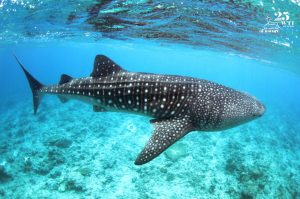– Madhumay Mallik
Back in the 1800s, the high seas offshore Veraval in Gujarat, were the preferred hunting grounds, if one wanted to catch a whale shark. Among the many trawlers that went in, it was Jivabhai’s Rajkamal, who led many of these expeditions. “During my active years as a young fisherman, I must have hunted more than 80 of these giants”, exclaims Jivabhai.
 There were substantial profits if you landed a whale shark. With high demand in the overseas markets, especially from Southeast Asia, whale sharks were particularly targeted. The fins and meat were exported and the liver was used by local fishermen to extract oil that would give a waterproof coating to their boat. Hunting one was not especially difficult either. Once an individual is located, all the fishermen needed to do was harpoon empty barrels that would make it hard for the fish to dive deeper. Soon exhausted, the whale shark would float up and then be dragged to the shore to be torn apart. Locally, the whale shark was also referred to as the “barrel fish”, for the same reasons.
There were substantial profits if you landed a whale shark. With high demand in the overseas markets, especially from Southeast Asia, whale sharks were particularly targeted. The fins and meat were exported and the liver was used by local fishermen to extract oil that would give a waterproof coating to their boat. Hunting one was not especially difficult either. Once an individual is located, all the fishermen needed to do was harpoon empty barrels that would make it hard for the fish to dive deeper. Soon exhausted, the whale shark would float up and then be dragged to the shore to be torn apart. Locally, the whale shark was also referred to as the “barrel fish”, for the same reasons.
“I was especially good at spotting. Whale sharks love feeding on krill, the congregation of which look like a pinkish patch on the surface of the water. Under the sun, these krill swarms flash a distinct glow, discernible even from afar. Whale sharks would always be around. It was just a matter of waiting if one didn’t spot any immediately”, recounts Jivabhai. “One whale shark brought in enough money that could replace months of regular fishing and weeks out at sea”, he adds. However, Jivabhai hadn’t yet realised what it meant to the survival of this fast-disappearing species.
Whale sharks along Indian coasts
These are species that prefer warm tropical waters. They migrate long distances and periodically gather in coastal waters for seasonal food sources. The Gulfs of Kutch and Khambhat are among the top known congregation sites but the fish is also quite common across the western coast of India. There have also been reports of whale shark pups from offshore Gujarat, pointing towards the importance of the population here.
Between 1999 and 2000, more than 600 whale sharks were hunted in just the fishing ports of Gujarat. Hunting, pre-2000, was on a massive scale, not just in Gujarat but across coastal India. There is little data to suggest the population estimates of the whale shark across the globe, making these congregation groups even more critical for the survival of the species.
of Gujarat. Hunting, pre-2000, was on a massive scale, not just in Gujarat but across coastal India. There is little data to suggest the population estimates of the whale shark across the globe, making these congregation groups even more critical for the survival of the species.
Through campaigns and years of lobbying, the whale shark was finally added to Schedule I of India’s Wildlife (Protection) Act, 1972 in 2001. Thus, accorded the highest level of protection, hunting whale sharks was made illegal and penalty in the form of imprisonment and fines was attached. The Gujarat Forest Department encouraged fishermen to release whale sharks that accidentally got entangled in the drag nets through a compensation scheme to cover for the loss of the net. NGO groups like Wildlife Trust of India (WTI) garnered the support of spiritual leaders like Morari Bapu to appeal to the masses and spread the message of conservation. It took a few years but the frequency of hunting reduced and “Barrel” soon became “Vhali” or “The Dear One” in the local language.
A large part of the success of the campaign was because of people like Jivabhai, who took upon the cause. Knowing whale sharks for the gentle giants they are and having spotted small pups several times in the sea, he understood what it meant. Morari Bapu’s message was that the whale shark visited Gujarat’s shores to bear her pups just like a mother visiting her parents to bear her newborn. “This puts the responsibility on us to protect the mother and her child. I now realise how ignorant I have been before”, adds Jivabhai. Whale sharks are more like us than one might realise. Each fish has its unique pattern of dots across its body, much like the human fingerprint. Jivabhai has been at the forefront of WTI’s campaign “Save the Whale Shark” and has since led the Veraval fishing community in creating safe waters for the world’s largest fish.

Friends of Vhali
Since the start of WTI’s campaign project in 2002, more than 900 whale sharks have been successfully released back into this coastal habitat by fishermen. WTI has successfully radio-tagged eight whale sharks, thus released, and the data has been giving insights as to the migration routes and other congregation sites of the fish. Back on ground, the campaign project has been gaining momentum among students, community members and local leaders. Jivabhai was felicitated by The Gujarat Forest Department with the “Friends of Whale Shark” Award at the 2019 Whale Shark Conference in Gandhinagar.
His boat, the famed ‘Rajkamal’, continues to navigate the seas, but with a distinct yellow flag that proudly announces that it is a “Friend of Vhali”. Aboard, is his son, who has assumed command and plays a key role as one of the lead volunteers in the campaign.
The success of the campaign has now been extended to other parts of India by WTI. In 2022, the ‘Save the Whale Shark’ campaign was launched in Karnataka and Kerala. Since then, volunteers have already rescued and released seven whale sharks that got accidentally caught in fishing nets. WTI’s team has been going from port to port, to reach out to students, fishermen, coast guards and the forest department, to spread the message of conservation and coexistence.
A long way to go
While there has been notable progress in the conservation of whale sharks since the 1900s, the species is in a more secure position. However, complete cessation of hunting has not been achieved, and occasional reports of whale shark poaching still surface in the news. Onboard trawling vessels in Honnavar, Karnataka, fishermen still believe that the massive fish they periodically come across is a shark. Some even admit having killed one in the recent past.
Unless the demand stops, it would be hard to completely curb the supply. There’s huge money in the illegal wildlife trade and it would require the world to come together to save its biggest fish.
(The author is the Assistant Manager of Communications at The Wildlife Trust of India)



